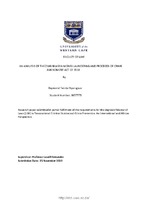| dc.contributor.advisor | Fernandez, Lovell | |
| dc.contributor.author | Nyarugwe, Raymond Tendai | |
| dc.date.accessioned | 2021-03-25T12:54:52Z | |
| dc.date.available | 2021-03-25T12:54:52Z | |
| dc.date.issued | 2020 | |
| dc.identifier.uri | http://hdl.handle.net/11394/8057 | |
| dc.description | Magister Legum - LLM | en_US |
| dc.description.abstract | Financial crimes are transnational in nature, and no country is immune from them. They are an international problem that can best be solved through international cooperation on a global scale. It is therefore necessary to have rules and norms that apply worldwide in order to deal with these crimes comprehensively.1 Of particular prominence is the crime of money laundering (ML), which may be defined as the processing of criminal proceeds to disguise their illegal origin.2 This term is relatively new and is broadly defined, with the definitions varying from jurisdiction to jurisdiction. In Zimbabwe, money laundering acts are listed in the Money Laundering and Proceeds of Crime Act 34 of 2013 (the Principal Act).3 The Financial Action Task Force (FATF) is the main international inter-governmental body formed specifically to set AML standards and to promote their implementation globally. | en_US |
| dc.language.iso | en | en_US |
| dc.publisher | University of Western Cape | en_US |
| dc.subject | Anti –money laundering | en_US |
| dc.subject | Crypto-currency | en_US |
| dc.subject | Egmont group | en_US |
| dc.subject | Financial intelligent unit (FIU) | en_US |
| dc.subject | Money laundering | en_US |
| dc.title | An analysis of the Zimbabwean money laundering and proceeds of crime amendment act of 2018 | en_US |
| dc.rights.holder | University of Western Cape | en_US |

